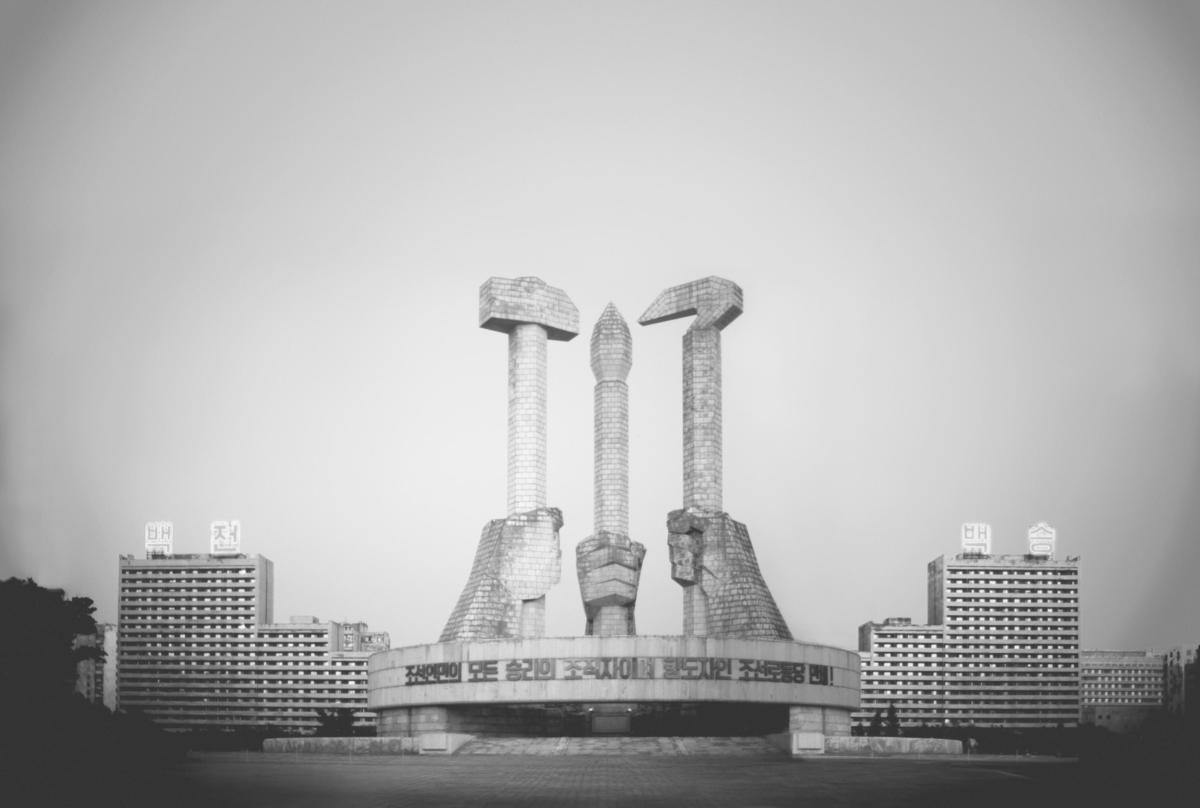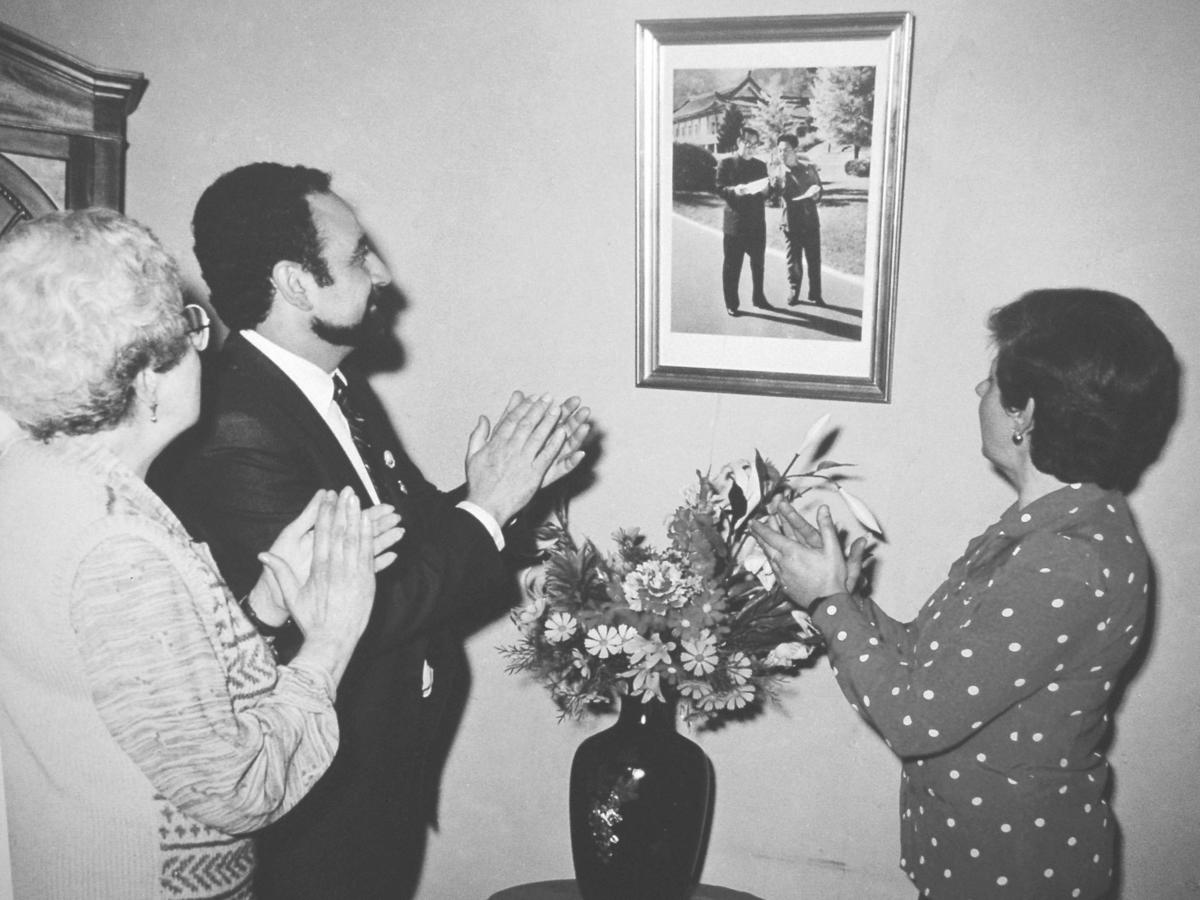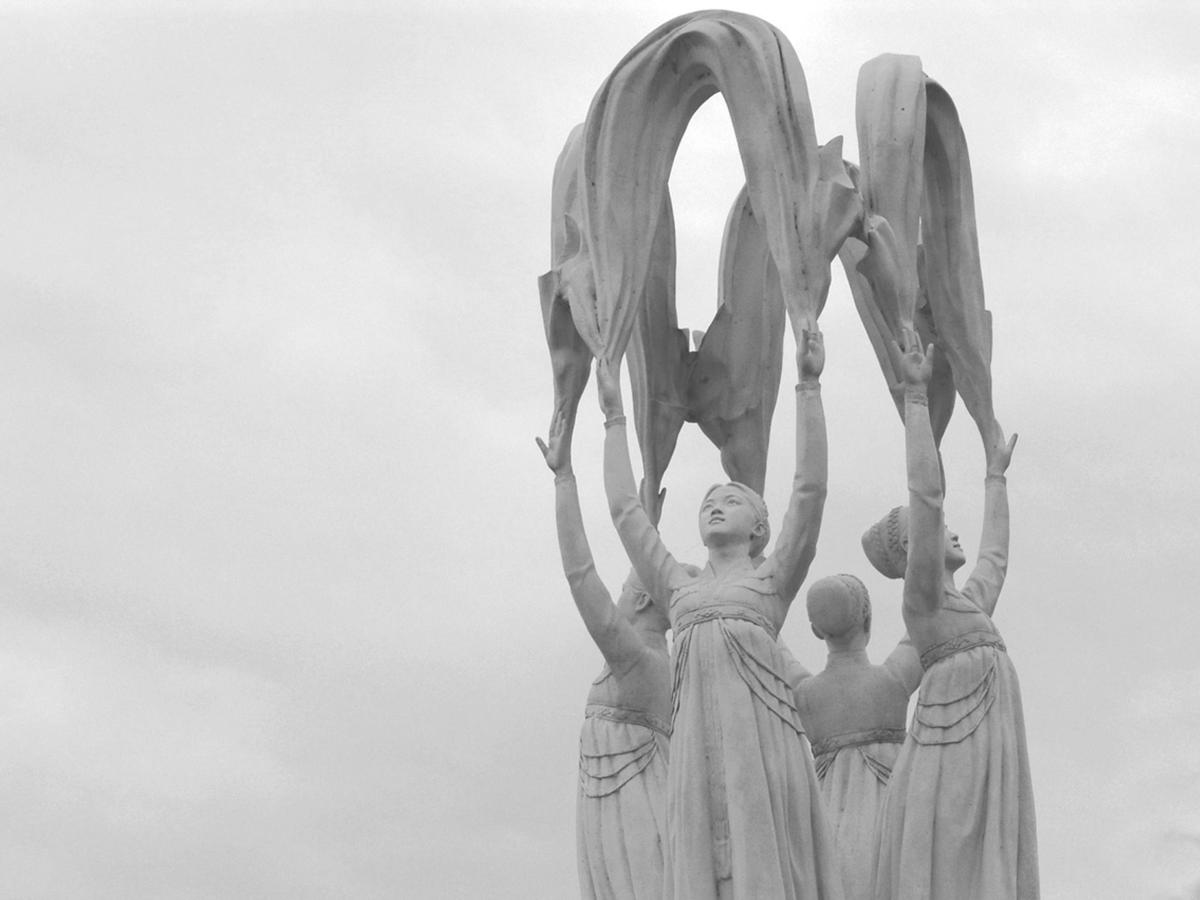
While only a few thousand tourists and a handful of journalists are allowed to enter the Democratic People’s Republic of Korea capital city of Pyongyang each year, Eva Munz, Christian Kracht, and Lukas Nikol went to North Korea to take photographs of a country of gigantic simulation, of which few images exist. In their forthcoming book, Die Totale Erinnerung, Kim Jong Ils Nordkorea (The Total Recall, Kim Jong Il’s North Korea, published in September 2006 by Rogner & Bernhard in Berlin), their photographs are accompanied by citations from Kim Jong Il’s On the Art of Cinema (University Press of the Pacific, September 2001). The North Korean dictator has a passion for cinema, dizzyingly intricate rules and regulations, his extensive wine collection, and Mazda RX-7 sports cars. “The producer from hell,” as John Gorenfeld called him in the Guardian, officially approves the ideology of films in story conferences, while the narratives are still being developed — controlling and improving North Korea’s international image. Within the context of Munz’s, Kracht’s, and Nikol’s recent travel to North Korea, Mauricio Guillen tries to reveal their found “realities” on the ground.
Eva Munz was born in Munich and studied filmmaking at Munich Academy of Film and Television. Based in Bangkok, Shanghai, and Berlin, she directs commercials, music videos, and short films. She also writes for magazines such as Der Freund.
Mauricio Guillen: Eva, I would like to draw attention to the nature of this interview; I’m formulating the questions in my studio in Hackney, London, and you’re reading them in Shanghai. Could you tell me a litle bit about your background and explain what exactly it is you do that keeps you traveling so much?
Eva Munz: I enjoy being in places that I can’t understand: the distant flashes of neon billboards speaking in tongues that are not my own — I find this reassuring,even comforting. I have lived and worked in Asia — namely India, Thailand, and China — for almost eight years and, although I call Berlin home now, I am still drawn to the East. Besides writing and photography, I’m trained as a filmmaker and have shot a lot of commercials all over Asia, in and about what Don DeLillo elegantly terms “the Esperanto of jetlag”: Toyota, Nivea, Kirin, Motorola, and Electrolux.
MG: You, Lukas Nikol, and Christian Kracht managed to spend some time together in one of the most hermetic places in the world, North Korea. Under what circumstances did you manage to get access to the place?
EM: Christian, Lukas and I planned to attend the 9th International Pyongyang Film Festival. We had heard about Kim Jong Il’s foible for movies and hoped very much to be able to see some North Korean films. Kim Jong Il has written a book titled The Art of Cinema, which is a rather didactic guideline for revolutionary filmmaking, in accordance with North Korean “Juche” ideology. The book is quite a bit more radically Marxist than say, the theoretical work of Eisenstein and Pudovkin, or the films of Dovzhenko. Our group was invited to attend the opening ceremonies. Oddly enough, the opening film was a heavyhanded Egyptian drama strong on pyrotechnics and Arab patriotism. In the evening, back at our hotel, we saw ourselves on local television, a bunch of foreigners amongst a large number of gray-garbed party officials. So our interest in the Democratic People’s Republic of Korea (DPRK) was in effect kindled by film, by the wish to be inside an empire of images.

MG: What exactly were the motivations to make a book about it?
EM: When we traveled to the DPRK, we had no intention of putting this book together. Some months later, Lukas Nikol and I looked at the massive number of pictures we had taken, and it hit us that Kim Jong Il is a great artist and that the DPRK is his masterpiece, a kind of gigantic 3-D installation, where the boundaries of reality, simulation, and simulacra have become so blurred that you wonder whether this man is a genius or if this is all accidental. In the course of the time we spent there, we became a part of his installation.
MG: Your photographs portray a country caught between the state media’s projected reality and what Baudrillard calls simulation. How can we, as remote spectators, get an understanding of the actual realities on the ground?
EM: We will absolutely not get an understanding of actual realities in everyday lives of the people because no foreign visitor will be able to socialize with, say, even a cab driver. Reality is the image the DPRK would like foreigners to see, period. We’re shown the beautiful things, the attractiveness of the DPRK. Why question a beautiful simulation, a Confucian simulation? After a day or so, you will start to come up with your own narrative anyway.
MG: In the group of images I have been given,you seem to make a conscious comparison between archival material of what appears to be political propaganda and the recent images you have produced there. In doing so, are you trying to point out how little things have changed in that part of the world, also suggested in the book’s title Die Totale Erinnerung (Total Recall)?
EM: The book’s title came to us because of the inherent melancholy of the place and the retro-futuristic timelessness it chooses to project. It reminds you of a Zeitmaschine or a kind of science fiction movie produced a long time ago. I felt a kind of nostalgia for a time I had not lived in, not experienced except in dreams. I kept thinking of Godard’s Alphaville — devoid of high-tech gadgets, gritty architecture, accompanied by a monotone phrase, “Bonjour, comment-allez vous. Je vais bien, merci.” A feeling of Chris Marker-like melancholy suffused everything in North Korea with a gentle glow.

MG: There seems to be a perfectly functioning subway system in Korea, which is only operative during official visits. During such occasions, public transport — more specifically the subway system — seems to be in use. I’ve been told the commuters are hired actors simulating travel. This is a grand statement to make about a place we know little about; it draws attention to the very edited daily reality of a country. Can you please clarify this rumor?
EM: I believe it is true. The subway train you mention is very much a set piece. On many occasions we were led through a huge set where every Korean was installed like an extra. Suddenly a flower shop would pop out at a deserted square, with one saleswoman who had exactly one bouquet on sale, and she would suggest we buy it and place it at the feet of Kim Il Sung’s golden statue. In the state library people would stare motionless at their computer screens, occasionally glancing over their shoulders to see whether we were still there. When asked, they explained that they were studying the country’s intranet. When our group left the room, Lukas and I would usually remain longer to take pictures and found on one occasion that once we had left a room, the lights were shut down and the student-extras just went home.
MG: How much of a gap do you think there is between the daily reality of North Korea and the way it chooses to present itself to the external world?
EM: There does not seem to be any daily reality. Thus its presentation to the external world is a representation, a hologram, if you like.
MG: As a foreigner, how do you negotiate the political reality of a place without falling into clichés? How do you avoid becoming an extension of, say, a Lonely Planet or Wallpaper* magazine navigator?
EM: The Lonely Planet seems to suggest that you “discover” a place, that you find the“ hole in the wall where you can knock back some cheap beer with the locals” or, in Wallpaper-speak: “kick back those Prada mules and indulge in the sumptuously appointed Korean spa.” When traveling to the DPRK your itinerary is locked down and there is no way you can go anywhere on your own, so these publications are as redundant in the DPRK as they are for traveling to any other place in the world.
MG: As someone who has managed to get access to North Korea, and based on your personal experience, how do you imagine this place in the future? How do you think your project contributes to that future?
EM: Obviously I would wish for a reunification of the peoples of Korea. We very sincerely and humbly hope to contribute to this goal with our book.